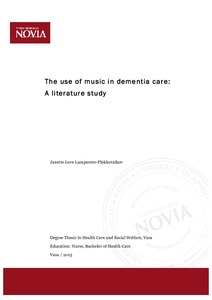The use of music in dementia care: A literature study
Plokhotnikov, Janette (2015)
Plokhotnikov, Janette
Yrkeshögskolan Novia
2015
All rights reserved
Julkaisun pysyvä osoite on
https://urn.fi/URN:NBN:fi:amk-2015112718221
https://urn.fi/URN:NBN:fi:amk-2015112718221
Tiivistelmä
The purpose of this study was to have a deeper understanding on how music impacts elderly people with dementia. In particular, the author intended to gain more knowledge on how music manages behavioural problems in elderly people suffering from dementia specifically agitation.
The theoretical framework used in this study was Eriksson’s theory of caritative caring. Five scientific articles were chosen to answer the aim of this literature study through a qualitative approach.
The main result of this study was that music has positive benefits to dementia. In particular, appropriate, relaxing or individualized music significantly lowers agitation. Music was also found to have positive effects in mood, socialization, cooperation, and communication and enhanced interaction. Other findings showed that music could be facilitated by a therapist, nurse, spouse or a family member or trained health provider at home, nursing homes or in any elderly institutional settings.
The theoretical framework used in this study was Eriksson’s theory of caritative caring. Five scientific articles were chosen to answer the aim of this literature study through a qualitative approach.
The main result of this study was that music has positive benefits to dementia. In particular, appropriate, relaxing or individualized music significantly lowers agitation. Music was also found to have positive effects in mood, socialization, cooperation, and communication and enhanced interaction. Other findings showed that music could be facilitated by a therapist, nurse, spouse or a family member or trained health provider at home, nursing homes or in any elderly institutional settings.
